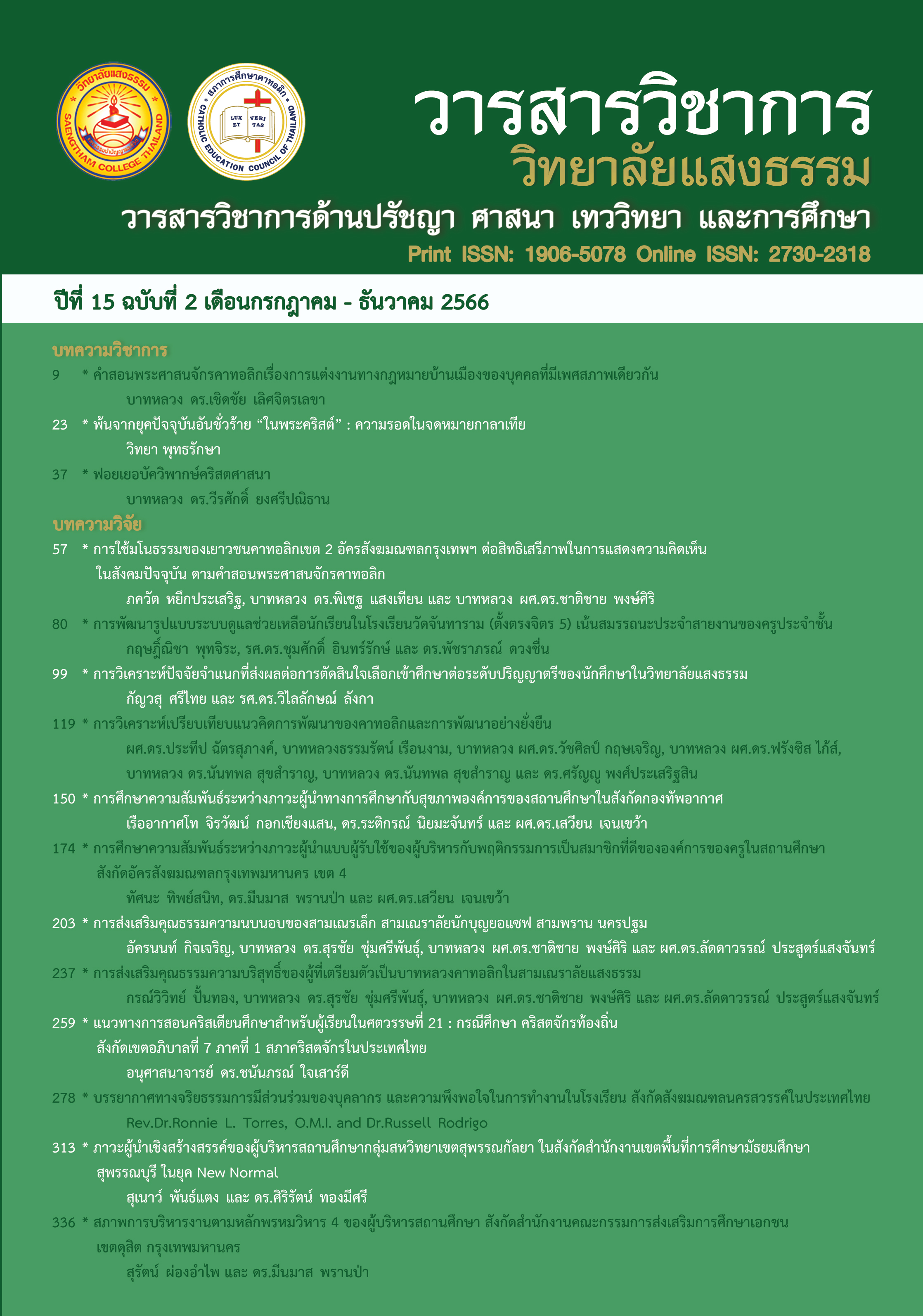Comparative Analytic of the Concept of Catholic Development and Sustainable Development.
Main Article Content
Abstract
This study has 3 objectives. It aimed to (1) study the concept of Catholic Development and Sustainable Development of the United Nations (2) analyze comparative between Goals of Catholic Development and Sustainable Development Goals of the United Nations, and (3) offer guidelines for the Social Work of Catholic Church.
This study utilized a qualitative research design. Data were collected from documents through the online data-based and were analyzed by inductive content analysis.
The data revealed the following findings. (1) Catholic development concept: It is the announcement of the good news and proclaim the Gospel. By focusing on the importance of human and social development; as God's people. While the concept of sustainable development is a reflection on the quality of life of humans and society, it’s about having good health by considering the basic elements of humanity in every dimension including the environment, which is an essential resource for human sustenance both now and in the future. (2) The consistency between the Catholic development goals and the sustainable development goals is that the Catholic Church has the development concepts and goals, which is the value of the Gospel. This value promotes and supports social mobility or social development to achieve the United Nations Sustainable Development Goals. Catholic organizations and communities are important engines for driving development. Social work of Catholic Church heals and solves problems resulting from development and lead local society to achieve the goals of sustainable development. (3) The Catholic Church's guidelines for social development are that the Catholic Church should analyze the causes of social problems, and operate in all dimensions of development, including prevention, promotion, healing, and rehabilitation.
Article Details

This work is licensed under a Creative Commons Attribution-NonCommercial-NoDerivatives 4.0 International License.
- The academic and research articles, as well as the content and opinions expressed therein, published in Saengtham College Journal are solely the responsibility of the respective author(s).
- Articles published in Saengtham College Journal are the property of Saengtham College. Reproduction, modification, or dissemination of all or part of the content in any form without written permission from Saengtham College is prohibited.
- Articles published in Saengtham College Journal are protected under the Copyright Act.
References
Bennich, T. et al. (2020). Deciphering the scientific literature on SDG interactions: A review and reading guide. Science of the Total
Environment. 728(1), 7-10. https://doi.org/10.1016/j.scitotenv.2020.138405
Caiado, R.G. Gusmao et al. (2018). A literature-based review on potentials and constraints in the implementation of the sustainable development goals. Journal of Cleaner Production. 198(1), 1276-1288. https://doi.org/10.1016/j.jclepro.2018.07.102
Diaz, Guidai. (2023). Religion in social and spiritual development. A case study on five Christian churches in Vasjo, Sweden. Linnaeus University.
Downing, Raymond. (2016). Christian involvement in Sustainable Development. Christian Journal for Global Health, 3(1), 73-76.
Gant, George F. (1979). Development administration: Concepts, goals, methods. The University of Wisconsin Press.
Riggs, Fred W. (ed.). (1970). Frontiers of Development Administration. Duke University Press.
Vogt, Markus. (2022). Development postcolonial: a critical approach to understanding SDGs in the perspective of Christian social ethics. Global Sustainability. 5(4), 1-9. https://doi.org/10.1017/sus.2021.31.
Weidner, Edward W. (1970). The Elements of Development Administration in Asia. Duke University Press.
จิรภา พฤกษ์พาดี และวีระ สมบูรณ์. (2557). ปัญญาชนคาทอลิกกับการพัฒนาสังคมไทย. วารสารวิจัยสังคม. 37(2), 125 – 194.
จิรภา พฤกษ์ภาดี. (2556). ทฤษฎีการพัฒนาของคาทอลิกไทยหลังสังคายนาวาติกันครั้งที่สอง. [วิทยานิพนธ์ปริญญาดุษฎีบัณฑิต]. จุฬาลงกรณ์มหาวิทยาลัย.
ชนิดา บุญญาศิริรักษ์. (2545). บทบาทของคณะกรรมการคาทอลิกเพื่อการพัฒนาในวิถีชีวิตของคนจนเมือง กรณีศึกษา ชุมชนแออัด เขตหนองแขม. [วิทยานิพนธ์ปริญญามหาบัณฑิต]. จุฬาลงกรณ์มหาวิทยาลัย.
บุษกร สุขแสน. (2557). การบริหารการพัฒนา. สำนักพิมพ์ศูนย์การศึกษาบึงกาฬ มหาวิทยาลัยราชภัฎอุดรธานี.
พรรณ์ทิพย์ เพ็ชรวิจิตร และวัชระ สินธุประมา. (2560). กำเนิดและพัฒนาการขององค์กรพัฒนาเอกชนที่มีพื้นฐานความเชื่อทางศาสนา: กรณีศึกษาพระศาสนจักรคาทอลิกและองค์กรพัฒนาเอกชนคาทอลิกไทย (ค.ศ. 1950-2000). วารสารวิชาการมนุษยศาสตร์และสังคมศาสตร์. 25(47), 283-303.
ศุภกานต์ แก้วพิรา. (2561). มิติเชิงประชาสังคมขององค์กรทางศาสตร์ในการช่วยเหลือผู้อพยพ. วารสารธรรมศาสตร์. 37(3), 79-98.
สยาม อรุณศรีมรกต และยงยุทธ วัชรดุลย์. (2559). เป้าหมายการพัฒนาที่ยั่งยืน 17 ประการ ของสหประชาชาติเพื่อโลกอนาคต. วารสารวิจัยสหวิทยาการไทย. 11(3), 1-7.
สีลม ไชยเผือก. (2002). คำสอนด้านสังคมของพระศาสนจักร. การพิมพ์คาทอลิกประเทศไทย.
อนุชา ไชยเดช. (2562). ความรักคือคำตอบ รวมบทเทศน์ สมณดำรัส สมณโอวาทของสมเด็จพระสันตะปาปาฟรังซิส โอกาสเสด็จเยือนราชอาณาจักรไทย 20-23 พฤศจิกายน 2019. สื่อมวลชนคาทอลิกประเทศไทย.


